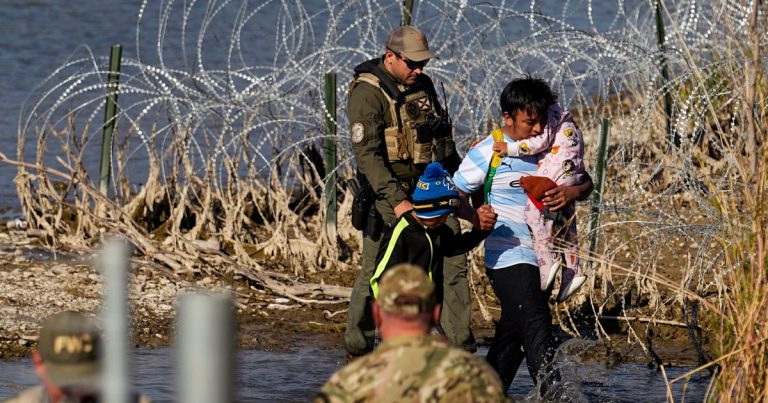In response to an escalating standoff between state officials and the federal government on border security, a group calling itself “The Army of God” said he would lead a convoy of up to 40,000 trucks from Virginia to the southern border this week, ending with a rally on Feb. 3. in Eagle Pass, Texas. With the declared goal of “taking back our border,” the organizers of the convoy paint a portrait of an America besieged by dark and evil forces. God, they say, has charged Christians to stop an immigrant invasion that is “poison the blood” from the country.
The organizers of the convoy paint a portrait of an America besieged by dark and evil forces.
According to a report on Tuesday afternoon, Things didn’t go as God’s Army planned. Wired magazine reports that there were only 20 trucks in the convoy by the time it reaches Jacksonville, Florida, and it remains unclear how many members of this so-called army, if any, will make it to the border.
But the attempt to amass an army on the border must still be taken seriously, and believing voters should see the mobilization effort for what it is: a mere Christian nationalism. As an evangelical pastor, I know it when I see it.
When the convoy organizers say they speak out against the “globalists” those who want to destroy America are not religious; they are racist, not to mention anti-Semitic. When they say they are acting in the name of God, they are saying that anyone who opposes them is opposing God’s will. Despite their attempts to give their views religious cover, it is only anti-immigrant hatred that they spread. Christianity does not teach to turn away people in need because they don’t look like you or don’t pray like you.
The most marginalized people are currently driving the immigration agenda, and because they are on the margins, they are necessarily out of step with most Americans and out of step with the reality on the ground. Nearly three years ago, a group of evangelical and Catholic religious leaders and I biked 3,200 miles along the border. We spoke with Border Patrol agents, ranchers, humanitarians, faith leaders, mayors, business owners, residents, and migrants, including asylum seekers. We found that there is indeed a crisis at the border, but that crisis endangers migrants, not American citizens.
Despite Republican rhetoric to the contrary, the border is secure unless you are a migrant. The only option to enter from the southern border is to cross the Rio Grande River, climb a wall or cross a desert. Why do people take such risks? Because they no longer have better options. Closures of border posts have increased and allowances for asylum applications have been considerably reduced.
The continuation of the “Stay in Mexico“The policy requires almost all asylum seekers to await their decision in Mexico, making them vulnerable to drug cartels. who take advantage of their desperation to cross the border or make them easy targets for kidnappings and other crimes. Meanwhile, the crisis continues intensify in parts of Mexico and Central American countries.
Yet instead of loving and welcoming our neighbors, as good Christians should, Christian nationalists seek to add fuel to the fire for political purposes. Clearly, some Christian voters, the primary audience for this pernicious vision of America, need to be shown why Christian nationalism and candidates like former President Donald Trump are anathema to Christian and democratic values. This is why our group of religious leaders will also travel to Eagle Pass and hold our own gathering on February 3rd.
Our plan was to present an alternative to the Christian nationalism promoted by the trucker convoy and to engage with members of the self-proclaimed Army of God. My organization, Vote Common Good, has a history of doing this. Several years ago, when the Proud Boys hosted one of our events in Florida, we then invited them for a conversation. at a local bar. It’s unclear if any members of the convoy will make it to Eagle Pass, but our plan is still to be there, and if they show up, we’ll be there to talk.
Through the lens of our shared Christian faith, we want to engage with people of all political ideologies, even those we consider extreme.
Through the lens of our shared Christian faith and through face-to-face conversations, we aim to engage with people of all different political ideologies – even those we consider extreme – and create a dialogue that allows for move away from radicalism. We want to send the message that Christians should support a humane immigration system that seeks to help those in need, not turn them away.
Ultimately, this weekend is one step in a larger journey we are taking this year to show believing voters across the country that there is another way. I am the executive director of Vote Common Good and, in our estimation, if only 3% of evangelical and Catholic voters If those who previously supported Trump are convinced not to do so this year, he and Christian nationalism will be defeated in the November election.
We are still heading toward the border assuming a stalemate, but a different one than the media initially predicted. The impasse we seek is the one between Christians who believe that God wants them to turn back migrants and those of us who believe the opposite, that God wants us to welcome all migrants with food and shelter.
This divide also exists within evangelical and Catholic communities across the country. The values and vision of America of the group that wins over the most believing voters this year could make all the difference, not only to what happens at the border, but also to the future character of our country.


